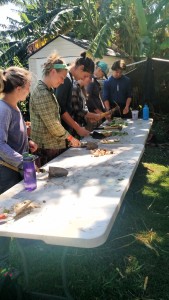 Horticultural Therapy is one of the cornerstones of Pacific Quest’s integrative, holistic approach. Recently, over sixty Pacific Quest employees participated in an all day training in horticultural therapy. Therapists and direct care staff worked side-by-side utilizing creative interventions, combining evidence-based practices with mind-body techniques.
Horticultural Therapy is one of the cornerstones of Pacific Quest’s integrative, holistic approach. Recently, over sixty Pacific Quest employees participated in an all day training in horticultural therapy. Therapists and direct care staff worked side-by-side utilizing creative interventions, combining evidence-based practices with mind-body techniques.
Horticulture Therapy Training
One of the main goals of this training was to have interactive and engaging lessons role-modeled for the program guides and to let them experience the numerous possibilities of teaching in the garden. In addition, this was an ideal opportunity to train program guides in both the hard skills of working on the land and the soft skills of utilizing the garden as a therapeutic tool. Program guides had the opportunity to analyze and brainstorm how to teach our curriculum and to unite the different aspects of the program with the garden.
The first half of the training focused on experiential activities that were based on the Five Pillars of Health (i.e. nutrition, sleep, movement, breathing, and the mind-body connection) and the ways in which these key elements of the program are brought to life in the garden. The second half focused on utilizing narrative education and concepts of rites of passage to teach about soil. Guides learned how research in horticultural therapy indicates that simple garden activities are compatible with evidence-based practices used to treat a myriad of clinical issues ranging from anxiety and depression, to trauma and stress related disorders.
Words from our Horticulture Therapy Director
Pacific Quest’s Horticultural Therapy Director, Travis Slagle M.A., commented, “For the adolescents and young adults that we work with, the simple task of growing a garden becomes a parallel process of the growth in oneself. Whether we are treating the emotional wounds of childhood, or the injured leaves of a common houseplant; the key factors of empathy, relatedness, and unconditional positive regard are still the same. Nature teaches us that everything that lives is biologically designed to grow and adapt. The same is true for the families and young people with whom we work. By actively experimenting with the process of growth and adaptation in nature, we become more aware of who we are and what we want to be.”